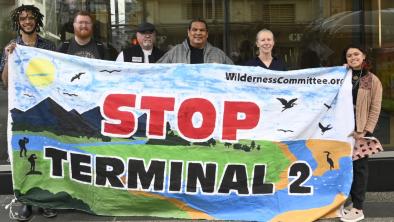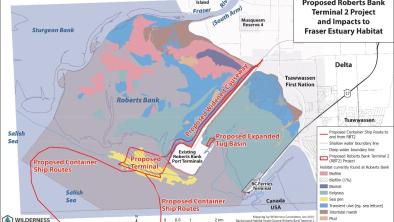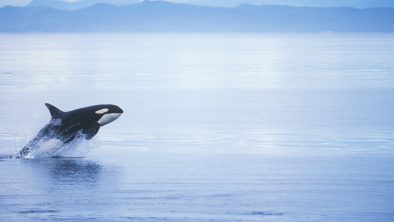Environmental groups back in court to defend killer whale ruling

Federal government seeks to reverse parts of 2010 decision on critical habitat protection
VANCOUVER — Ecojustice will appear before the federal Court of Appeal today to defend a precedent-setting ruling that confirmed the federal government is legally bound to protect killer whale habitat. Ottawa has since appealed the ruling.
Ecojustice, representing a coalition of nine environmental groups, successfully argued in Federal Court last year that the Department of Fisheries and Oceans (DFO) had not met its legal obligation to protect killer whales. The court ruled that the Minister of Fisheries and Oceans must legally protect all aspects of killer whale critical habitat — including their food supply and the quality of their marine environment.
DFO is now trying to overturn that decision, claiming that discretionary provisions in the Fisheries Act adequately protect the critical habitat of aquatic species such as the killer whale.
The Act however, does not make critical habitat protection mandatory, as is the case under the Species at Risk Act. Instead, the Fisheries Act gives Minister Keith Ashfield broad discretion to authorize activities that destroy habitat.
“The federal court is correct in declaring that the fate of killer whales should not be left to the discretion of politicians,” said Margot Venton, staff lawyer at Ecojustice. “These whales must be protected by law. They need spaces to feed, breed and raise their young if their populations are going to survive and recover.”
Central to the issue are two distinct populations of killer whales that traverse British Columbia’s coastal waters, the northern and southern residents. At last count there were 264 threatened northern residents and just 87 endangered southern residents. Both species are listed under SARA.
Killer whales are considered a “sentinel species,” which means their health is a bellwether for the overall health of the ocean environment in which they live.
“It’s crazy that we have been forced to go back to court once again to protect Canada’s killer whales,” said Gwen Barlee, policy director with the Wilderness Committee. “DFO needs to quit wasting time and money and get on with the business of actually protecting these killer whales.”
In his decision last year, Federal Court Justice James Russell held that DFO had failed to legally protect killer whale critical habitat and made 13 declarations that included:
- DFO unlawfully relied on non-binding policies and guidelines, as well as government discretion, to protect habitat.
- DFO unlawfully limited the scope of legal protection to exclude biological elements of critical habitat.
- DFO has a legal obligation to protect the biological aspects of critical habitat, such as prey (food) availability and marine environment quality, through law.
The victory was precedent-setting for the more than 90 endangered and threatened marine species listed under the Species at Risk Act, all of which depend on healthy habitats to survive.
For more information on the killer whales, please see our backgrounder HERE.
Ecojustice is representing the David Suzuki Foundation, Dogwood Initiative, Environmental Defence, Greenpeace, Georgia Strait Alliance, International Fund for Animal Welfare, Raincoast Conservation, Sierra Club of BC and the Wilderness Committee.
The hearing begins today at 9:30 a.m. PT in the Federal Court of Appeal (701 West Georgia Street, Room 601) and is expected to last three hours.
Coalition members will be available to speak on-camera today following the hearing at 12:30 p.m.
B-roll of killer whales swimming:
Southern Resident Killer Whales from Maria Chantelle Tucker on Vimeo.
For more information, please contact:
Kimberly Shearon, communications coordinator | Ecojustice
604.685.5618 x242
Gwen Barlee, policy director | Wilderness Committee **
604.202.0322 (c) | 604.683.8220 (w)
Colin Campbell, marine campaign coordinator | Sierra Club — BC
250.386.5255 x236 | 250.361.6476 (c)
Will Horter, executive director | Dogwood Initiative
250.418.1672 (c)
Misty MacDufee, biologist | Raincoast Conservation **
250.818.2136 (c)


